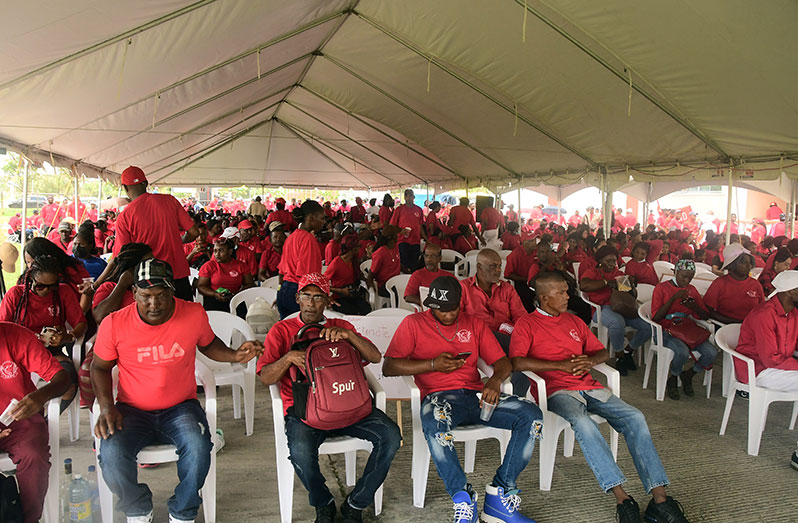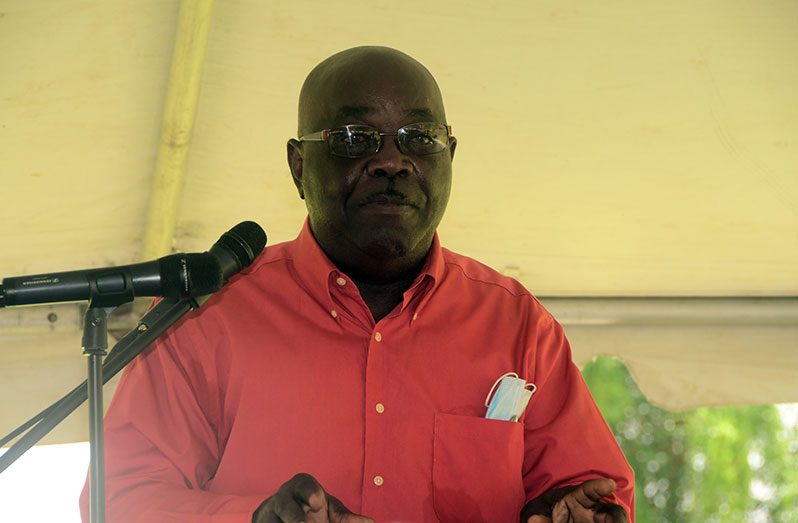GUYANA celebrated Labour Day on Sunday and several leading trade unionists used the opportunity to restate their call for finalisation of the increase in the national minimum wage to $60,000.
Guyana’s main two umbrella trade union bodies, the Federation of Independent Trade Unions of Guyana (FITUG), the Guyana Trade Union Congress (GTUC), held their customary rallies which saw the various workers wearing the signature red t-shirts and marching down the streets of Georgetown.
The FITUG rally started in front of the Bank of Guyana on Main and Church Streets and ended at the GNS Ground on CARIFESTA Avenue, while the GTUC rally started at Parade Ground and ended at the Critchlow Labour College on Woolford Avenue.
At the end of each rally, presentations were made by the various trade unionists to those gathered. At the FITUG rally, President of the Union, Carvil Duncan voiced his thoughts on the need for finalisation of the increase to the national minimum wage, given the rising cost of living brought on by the COVID-19 pandemic and the war between Russia and Ukraine.
“Even though we were promised an increase in the minimum wage that has not been realised and we are asking that the government consider that,” Duncan noted.

Notwithstanding the fact that the Ministry of Labour (MoL)’s National Tripartite Committee (NTC) officially giving its nod in January to the increase of the national minimum wage from $44,200 to $60,000, the official government order to set the increase into law has not yet been issued.
The national minimum wage has not been increased since 2017, when it was raised from an hourly rate of $202 to $255, taking the monthly salary from $35,000 to $44,200 for a 40-hour week. Comparatively, the minimum wages for the public sector is currently $70,000.
Nonetheless, apart from the wait on the national minimum wage increase, Duncan noted that he must commend the work of the MoL, which has been working assiduously to improve the lives of workers across the country.
Duncan during his remarks also took a moment to remember those workers who lost their lives to COVID-19 and reminded of how the labour force has been affected by the pandemic in several respects.
“Even though we celebrate May Day, there are some workers who cannot celebrate because they lost their lives to COVID-19 and we sympathise with their family [sic],” Duncan noted.

Similar sentiments to Duncan’s were expressed by General-Secretary of the GTUC, Lincoln Lewis, who addressed a gathering at the Critchlow Labour College.
“In 2020, the COVID-19 pandemic created a new challenge for the safety and security of workers. The world over, more than six million lost their lives to the pandemic. In Guyana, more than 1,200 left us as a result of the pestilence. These are past, present and potential workers. GTUC takes this time to remember them and their families,” Lewis expressed.
Lewis also reminded those present that Labour Day is recognised as a symbol of workers’ continued struggle to lift their standards of living and better the conditions under which labour toils.
“The gains of our ancestors must not only be revered, but they must also be built upon and protected. We take the stand as guardians of the legacy of Hubert Nathaniel Critchlow, Joseph Pollydore, Jane Phillips-Gay, Ayube Edun and others, and will stand steadfast to ensure and support the struggles of labour, where and when necessary,” Lewis noted.
Treasurer of FITUG, Seepaul Narine, also spoke at occasion. He praised the Local Content Act and urged local workers to always display good work ethics to win the competitive edge in the work market.
“On this matter, we recognise efforts of the government to increase and improve training opportunities to ensure that our people can take up various roles. We are supportive of the Local Content Act which we believe will go a long way to address this challenge. We urge that every effort be made to ensure that the Act is respected, and FITUG remains willing to play an active role.
We also encourage a comprehensive examination be conducted prior to the issuance of work permits to promote the employment of qualified locals. This may require the collaboration of several agencies,” he said.



.jpg)








